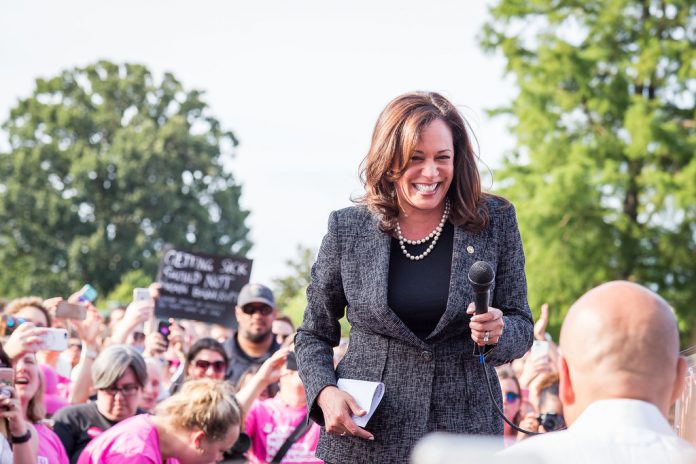What’s an unpopular politician with low charisma and an unflattering record to do when she’s suddenly thrust into the spotlight of a presidential campaign?
Promise to make it rain, of course!
Vice President Kamala Harris kicked off her substitute presidential campaign on Monday by promising to pass two policies that were dropped from President Joe Biden’s Inflation Reduction Act when members of Congress balked at the price tag: paid family leave and government-funded child care.
“We believe in a future…where every person has access to paid family leave and affordable child care,” Harris said in an address to campaign staff in Delaware on Monday, as she officially took the reins of what had been Biden’s reelection effort. The rest of Harris’ message was standard-issue fare from the Biden agenda—including promises to boost the middle class, protect seniors, and ensure Americans have affordable health care.
But the nods to family leave and child care were noteworthy because they signal what Harris sees as an opportunity to define herself as even more economically progressive than Biden.
The original version of what eventually became the Inflation Reduction Act was a $4 trillion spending package—known throughout 2021 as Biden’s “Build Back Better” initiative—that included $585 billion for a variety of family and child programs. That included about $200 billion for a four-week paid family and medical leave program and $270 billion for six years of a new child care subsidy program (the actual price tag of that program would be larger if viewed over 10 years, as is standard).Both were cut from the package due to opposition from Sen. Joe Manchin (D–W.Va.) and other Senate Democrats who were unwilling to vote for such a massive spending plan while inflation and deficits were surging.
Expect both initiatives to figure prominently in Harris’ campaign, particularly as she tries to shore up support from the progressive left, which might view the former prosecutor skeptically. Effectively, this would be a retread of Harris’ mostly forgettable primary campaign in 2019, when she’d pushed far to the left on economic issues in an attempt to steer away from her record as a prosecutor and attorney general.During that campaign, she’d proposed giving parents and other caregivers up to six months of paid leave from work. It was a more radical plan than what other Democrats had offered during that campaign, and even left-leaning publications like Vox expressed skepticism that Harris’ proposal was politically workable or economically feasible.
Harris dropped out of that campaign before a single vote was cast, but she’s now emerged as the Democrats’ presumptive nominee this year after Biden’s sudden departure from the race. That means she’s now in a position to advance a proposal that was rejected by Democratic primary voters in 2020 (when they chose Biden over Harris, Elizabeth Warren, and others) and by Congress in 2022 when it passed the IRA.
Harris has also endorsed taking dramatic steps, if necessary, to get her agenda through Congress. In 2019, she called for ending the filibuster in order to pass the Green New Deal. (It’s interesting that she did that at a time when Republicans controlled the White House and the Senate majority—in other words, at a moment when ending the filibuster would have helped the Republican Party achieve its own goals, not hers.)
Expect that approach to continue. “The line I got from advocates today is that while they don’t necessarily expect a big break from Biden on policy, they can imagine [Harris] being even more aggressive on procedure/tactics,” noted Semafor reporter Jordan Weissman on X.
If Harris does indeed push to the left on economic issues, voters will be left to pick between a Republican Party that wants to meddle more in personal and business affairs, and a soon-to-be-confirmed Democratic nominee who wants to borrow and spend more aggressively—and who is unwilling to take “there aren’t enough votes in the Senate for your agenda” as an answer.
Originally published by Reason Foundation. Republished with permission.
For more from Budget & Tax News.
For more public policy from The Heartland Institute.











